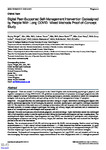Digital Peer-Supported Self-Management Intervention Codesigned by People With Long COVID: Mixed Methods Proof-of-Concept Study
| dc.contributor.author | Wright, H | |
| dc.contributor.author | Turner, A | |
| dc.contributor.author | Ennis, S | |
| dc.contributor.author | Percy, C | |
| dc.contributor.author | Loftus, G | |
| dc.contributor.author | Clyne, Wendy | |
| dc.contributor.author | Matouskova, G | |
| dc.contributor.author | Martin, F | |
| dc.date.accessioned | 2022-10-31T12:40:58Z | |
| dc.date.issued | 2022-10-14 | |
| dc.identifier.issn | 2561-326X | |
| dc.identifier.issn | 2561-326X | |
| dc.identifier.other | e41410 | |
| dc.identifier.uri | http://hdl.handle.net/10026.1/19791 | |
| dc.description.abstract |
<jats:sec> <jats:title>Background</jats:title> <jats:p>There are around 1.3 million people in the United Kingdom with the devastating psychological, physical, and cognitive consequences of long COVID (LC). UK guidelines recommend that LC symptoms be managed pragmatically with holistic support for patients’ biopsychosocial needs, including psychological, emotional, and physical health. Self-management strategies, such as pacing, prioritization, and goal setting, are vital for the self-management of many LC symptoms.</jats:p> </jats:sec> <jats:sec> <jats:title>Objective</jats:title> <jats:p>This paper describes the codevelopment and initial testing of a digital intervention combining peer support with positive psychology approaches for self-managing the physical, emotional, psychological, and cognitive challenges associated with LC. The objectives of this study were to (1) codesign an intervention with and for people with LC; (2) test the intervention and study methods; (3) measure changes in participant well-being, self-efficacy, fatigue, and loneliness; and (4) understand the types of self-management goals and strategies used by people with LC.</jats:p> </jats:sec> <jats:sec> <jats:title>Methods</jats:title> <jats:p>The study used a pre-post, mixed methods, pragmatic, uncontrolled design. Digital intervention content was codeveloped with a lived-experience group to meet the needs uncovered during the intervention development and logic mapping phase. The resulting 8-week digital intervention, Hope Programme for Long COVID, was attended by 47 participants, who completed pre- and postprogram measures of well-being, self-efficacy, fatigue, and loneliness. Goal-setting data were extracted from the digital platform at the end of the intervention.</jats:p> </jats:sec> <jats:sec> <jats:title>Results</jats:title> <jats:p>The recruitment rate (n=47, 83.9%) and follow-up rate (n=28, 59.6%) were encouraging. Positive mental well-being (mean difference 6.5, P<.001) and self-efficacy (mean difference 1.1, P=.009) improved from baseline to postcourse. All goals set by participants mapped onto the 5 goal-oriented domains in the taxonomy of everyday self-management strategies (TEDSS). The most frequent type of goals was related to activity strategies, followed by health behavior and internal strategies.</jats:p> </jats:sec> <jats:sec> <jats:title>Conclusions</jats:title> <jats:p>The bespoke self-management intervention, Hope Programme for Long COVID, was well attended, and follow-up was encouraging. The sample characteristics largely mirrored those of the wider UK population with LC. Although not powered to detect statistically significant changes, the preliminary data show improvements in self-efficacy and positive mental well-being. Our next trial (ISRCTN: 11868601) will use a nonrandomized waitlist control design to further examine intervention efficacy.</jats:p> </jats:sec> | |
| dc.format.extent | e41410-e41410 | |
| dc.format.medium | Electronic | |
| dc.language | en | |
| dc.language.iso | eng | |
| dc.publisher | JMIR Publications | |
| dc.subject | COVID-19 | |
| dc.subject | UK | |
| dc.subject | United Kingdom | |
| dc.subject | cognitive | |
| dc.subject | digital intervention | |
| dc.subject | efficacy | |
| dc.subject | goal setting | |
| dc.subject | intervention | |
| dc.subject | long COVID | |
| dc.subject | peer support | |
| dc.subject | physical | |
| dc.subject | psychological | |
| dc.subject | self-management | |
| dc.title | Digital Peer-Supported Self-Management Intervention Codesigned by People With Long COVID: Mixed Methods Proof-of-Concept Study | |
| dc.type | journal-article | |
| dc.type | Journal Article | |
| plymouth.author-url | https://www.ncbi.nlm.nih.gov/pubmed/36166651 | |
| plymouth.issue | 10 | |
| plymouth.volume | 6 | |
| plymouth.publication-status | Published online | |
| plymouth.journal | JMIR Formative Research | |
| dc.identifier.doi | 10.2196/41410 | |
| plymouth.organisational-group | /Plymouth | |
| plymouth.organisational-group | /Plymouth/Faculty of Health | |
| plymouth.organisational-group | /Plymouth/Faculty of Health/Peninsula Medical School | |
| plymouth.organisational-group | /Plymouth/REF 2021 Researchers by UoA | |
| plymouth.organisational-group | /Plymouth/REF 2021 Researchers by UoA/UoA03 Allied Health Professions, Dentistry, Nursing and Pharmacy | |
| plymouth.organisational-group | /Plymouth/Users by role | |
| plymouth.organisational-group | /Plymouth/Users by role/Academics | |
| dc.publisher.place | Canada | |
| dcterms.dateAccepted | 2022-09-07 | |
| dc.rights.embargodate | 2022-11-1 | |
| dc.identifier.eissn | 2561-326X | |
| dc.rights.embargoperiod | Not known | |
| rioxxterms.versionofrecord | 10.2196/41410 | |
| rioxxterms.licenseref.uri | http://www.rioxx.net/licenses/all-rights-reserved | |
| rioxxterms.licenseref.startdate | 2022-10-14 | |
| rioxxterms.type | Journal Article/Review |


